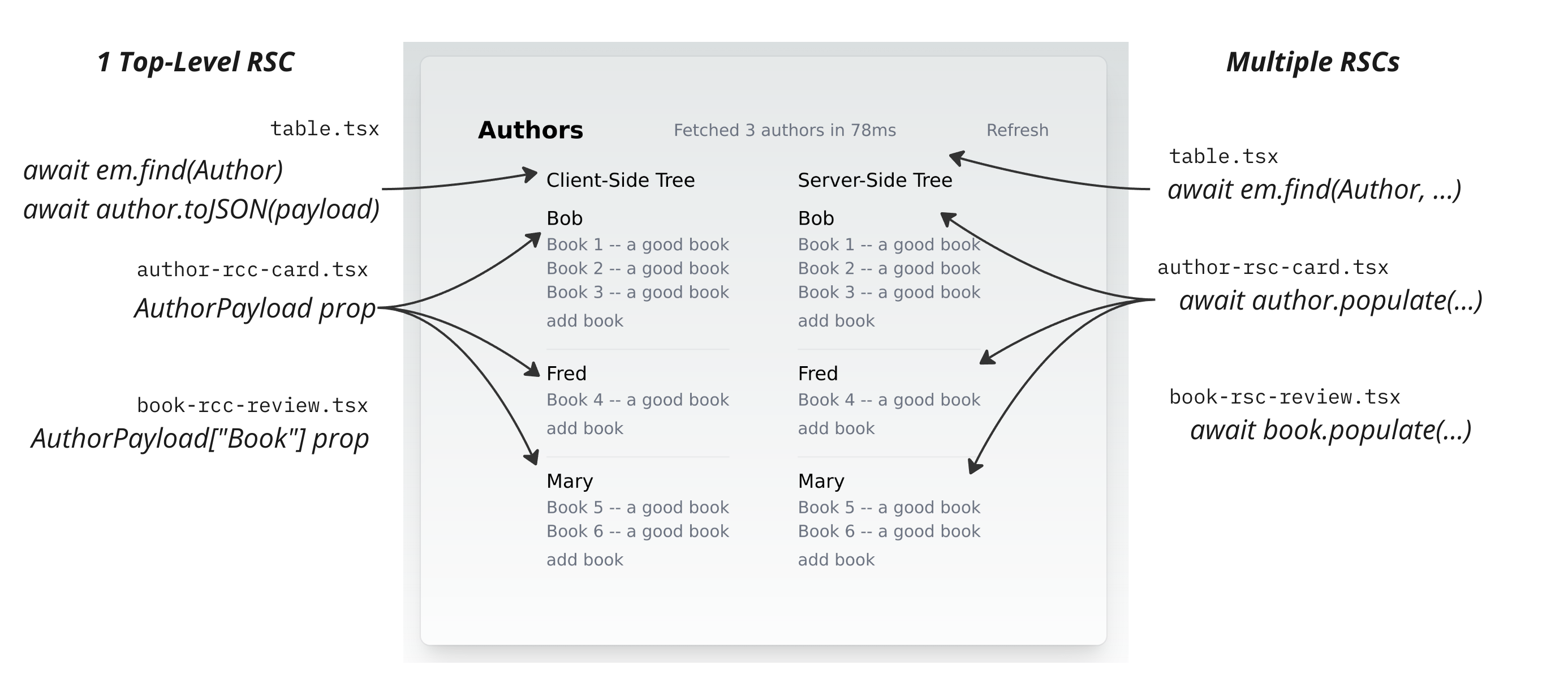New NextJS Sample App
We’ve added a new NextJS + Joist sample app that shows how Joist can be used in a NextJS application, with several benefits:
- Automatic N+1 Prevention
- JSON Payload/Props Creation
- Optional Join-based Preloading
This post gives a short overview; if you’d like to watch a video, we also have a YouTube video that walks through the sample app.
Two Render Tree Approaches
Section titled “Two Render Tree Approaches”While building the sample app, we found two fundamental ways of structuring a NextJS app’s render tree:
- Fewer RSCs (left side), that prop drill data to the Client Components
table.tsxis a server component that loads all data for the treeauthor-rcc-card.tsxandbook-rcc-preview.tsxare client components that accept prop-drilled data
- Mostly RSCs (right side), with Client Components only at the bottom
table.tsxis a server component but only loads what it needsauthor-rsc-card.tsxandbook-rsc-preview.tsxare RSC and do their own data loading

The top-level Table / table.tsx component renders each of these side-by-side, so we can see the differences, and observe some pros/cons of each approach.
-
With mostly RSC components, it’s easy to decompose data loading away from the top-level component.
For example, the
AuthorRscCardcan make its own data loading calls, and even if it’s render many pages on the page, Joist will de-dupe across theNsiblingAuthorRscCards, and batch into a single SQL call.type AuthorCardProps = {/** RSCs can accept the domain model enities as a prop. */author: Author;addBook: (id: string) => Promise<void>;};/** The RSC version of AuthorCard can load it's own data. */export async function AuthorRscCard({ author, addBook }: AuthorCardProps) {// This will be auto-batched if many cards render at onceconst books = await author.books.load();// Or if you wanted a tree of data, this will also be auto-batchedconst loaded = await author.populate({ books: { reviews: "ratings" } });return <div>...jsx</div>;}This is nice because it allows the
AuthorRscCardto be more self-sufficient, and allow the parent table component to be unaware of its children loading details. -
With mostly Client components, the opposite happens, and only the parent can make database /
EntityManagercalls, and so is responsible for loading all the data for its children, and passing it as JSON via props:type AuthorCardProps = {/** RCCs must accept a POJO of `Author` + all nested data. */author: AuthorPayload;addBook: (id: string) => Promise<void>;};/** The RCC version of AuthorCard accepts the `AuthorPayload`. */export function AuthorRccCard({ author, addBook }: AuthorCardProps) {// can only use data already available on `author`}Even though the up-front data load can become awkward, it does give more opportunities for optimizations; for example Joist can use join-based preloading to load a single tree of
Author+Book+Reviewentities in a single SQL call, which is even better optimization than the “one query per layer” N+1 prevention of the RSC-based approach.
Automatic N+1 Prevention
Section titled “Automatic N+1 Prevention”In either approach, Joist’s N+1 prevention auto-batches database calls, even if they are made across separate component renders.
I.e. in the RSC components:
- The top-level
Tablecomponent makes 1 SQL call for allAuthorentities. - All 2nd-level
AuthorRscCardcards each make their ownauthor.books.load()(orauthor.populate(...)) call, but because they’re all rendered in the same event loop, Joist batches all theloadcalls into 1 SQL call - Any 3rd-level components would have their
loadcalls batched as well.
In the React Client Component approach, this auto-batching is admittedly not as necessary, assuming a singular top-level component, like Table, loads all the data at once anyway (although, as mentioned later, Joist can optimize that as well).
See the Avoiding N+1s section of our docs for more information.
JSON Payload/Props Creation
Section titled “JSON Payload/Props Creation”Since the client components cannot make their own async data calls, the top-level Table components is responsible for loading all the data into a JSON payload, and passing it down to the children as props.
Joist entities have an easy way of doing this is, via a toJSON method that takes the shape of data to create:
// Define the shape of data to createexport const authorHint = { id: true, firstName: true, books: { id: true, title: true, reviews: ["id", "rating"], }, customField: (a) => a.id + a.title,} satisfies JsonHint<Author>;
// This typedef can be used in the client-side props, or to match any// endpoint-based respones types like for REST/OpenAPI.export type AuthorPayload = JsonPayload<Author, typeof authorHint>;
const payload = await a.toJSON(authorHint);The toJSON implementation will:
- Load any relations that are not yet loaded from the database
- Output only the keys that are requested in the
authorHint - Call any lambdas like
customFieldto generate custom values
As with previous examples, all data loading is N+1 safe, and also potentially join-based preloaded.
See the toJSON docs for more information.
This recursive toJSON payload generation is a relatively new feature of Joist, so if you have feature ideas that would make it more useful, please let us know!
Join-Based Preloading
Section titled “Join-Based Preloading”The last optimization that Joist can do is join-based preloading, which can be used in either the RSC or RCC approach.
This is also a newer feature that requires opt-ing in to, but in em.ts you can add a preloadPlugin:
/** Returns this request's `EntityManager` instance. */export const getEm = cache(() => { // Opt-in to preloading const preloadPlugin = new JsonAggregatePreloader(); return new EntityManager({}, { driver, preloadPlugin });});This will allow Joist to load a deep tree/subgraph of entities in a single SQL call.
For example, normally a Joist em.find a call like:
const a = await em.find( Author, { id: 1 }, {populate: { books: "reviews" } },);// Now access all the data in memoryconsole.log(a.books.get[0].reviews.get[0].rating)Will issue three SQL calls:
SELECT * FROM authors WHERE id = 1;SELECT * FROM books WHERE author_id = 1;SELECT * FROM reviews WHERE book_id IN (1, 2, 3, ...);But with the preloadPlugin enabled, it will use a single SQL call that uses CROSS JOIN LATERAL and json_agg to return the author’s books, and the book’s reviews (omitted for brevity) in a single row:
select a.id, _b._ as _b from authors as a cross join lateral -- create a tuple for each book, and aggregate then into an array of books select json_agg(json_build_array(_b.id, _b.title, _b.foreword, _b.author_id) order by _b.id) as _ from books _b where _b.author_id = a.id ) _b where a.id = ? limit ?Joist’s join-based preloading is still a beta feature, so if you run into any issues, please let us know!
What about Complex Queries?
Section titled “What about Complex Queries?”So far, our queries have focused on loading “just entities”, and then putting those on the wire (or rendering them to HTML).
This is because Joist’s focus is on building robust domain models, and specifically helping solve the “write-side” of your application’s business logic (running the correct validation rules, lifecycle hooks, reactive updates), and less so on the “read-side” of complex queries (i.e. that using aggregates using GROUP BY, multiple nested subqueries/projections/etc.).
As such, Joist does not yet have a sophisticated query builder that can create arbitrary SQL queries, like Kysley or Drizzle.
Instead, Joist encourages an approach that uses its robust write-side features to create materialized columns in the database, such that the majority of your pages/responses really can be served by “super simple SELECT statements”, instead of using complicated queries to calculate aggregates on-the-fly.
Although you can of course use both approaches, and just use a lower-level query builder where needed.
Sample App Feedback
Section titled “Sample App Feedback”Joist’s roots come from the GraphQL world, so this sample app was our first foray into using it for a NextJS application. If we’ve missed any key features that would make it easier to use Joist in a NextJS app, please let us know!

